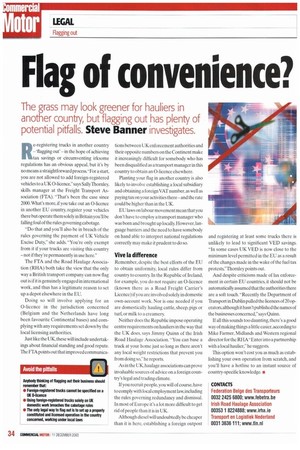Flag of convenience?
Page 34

If you've noticed an error in this article please click here to report it so we can fix it.
The grass may look greener for hauliers in another country, but flagging out has plenty of potential pitfalls. Steve Banner investigates.
Re-regjstering trucks in another country 'flagging out' in the hope of achieving tax savings or circumventing irksome regulations has an obvious appeal. but it's by no means a straightforward process."For a start, you are not allowed to add foreign-registered vehicles to a UK 0-licence," says Sally Thornley, skills manager at the Freight Transport Association (FTA). "That's been the case since 2000. What's more, if you take out an 0-licence in another EU country, register your vehicles there hut operate them solely in Britain you'll be falling foul of the rules governing cabotage.
"Do that and you'll also be in breach of the rules governing the payment of UK Vehicle Excise Duty," she adds. "You're only exempt from it if your trucks are visiting this country not if they're permanently in use here."
The FTA and the Road Haulage Association ( R HA) both take the view that the only way a British transport company can now flag out is if it is genuinely engaged in international work, and thus has a legitimate reason to set up a depot elsewhere in the EU.
Doing so will involve applying for an 0-licence in the jurisdiction concerned (Belgium and the Netherlands have long been favourite Continental bases) and complying with any requirements set down by the local licensing authorities.
Just like the UK.these will include undertakings about financial standing and good repute. The FTA points out that improved communica tions between UK enforcement authorities and their opposite numbers on the Continent make it increasingly difficult for somebody who has been disqualified as a transport manager in this country to obtain an 0-licence elsewhere.
Planting your flag in another country is also likely to involve establishing a local subsidiary and obtaining a foreign VAT number, as well as paying tax on your activities there and the rate could be higher than in the UK.
EU laws on labour movement mean that you don't have to employ a transport manager who was born and brought up locally. However, Ianguage barriers and the need to have somebody on hand able to interpret national regulations correctly may make it prudent to do so.
Vive la difference
Remember, despite the best efforts of the EU to obtain uniformity. local rules differ from country to country. In the Republic of Ireland, for example, you do not require an 0-licence (known there as a Road Freight Carrier's Licence) if you are involved solely in domestic own-account work. Nor is one needed if you are domestically hauling cattle, sheep, pigs or turf, or milk to a creamery.
Neither does the Republic impose operating centre requirements on hauliers in the way that the UK does, says Jimmy Quinn of the Irish Road Haulage Association. "You can base a truck at your home just so long as there aren't any local weight restrictions that prevent you from doing so," he reports.
As in the UK, haulage associations can prove invaluable sources of advice on a foreign country's legal and trading climate.
If you recruit people, you will of course. have to comply with local employment law. including the rules governing redundancy and dismissal. In most of Europe it's a lot more difficult to get rid of people than it is in UK.
Although diesel will undoubtedly be cheaper than it is here, establishing a foreign outpost and registering at least some trucks there is unlikely to lead to significant VED savings. "In some cases UK VED is now close to the minimum level permitted in the EU as a result of the changes made in the wake of the fuel tax protests."Thornley points out.
And despite criticisms made of lax enforcement in certain EU countries, it should not be automatically assumed that the authorities there are a soft touch. "Recently the Department of Transport in Dublin pulled the licences of 20 operat ors.although it hasn't published the names of he businesses concerned," says Quinn.
If all this sounds too daunting. there's a good way of making things a little easier.according to Mike Farmer. Midlands and Western regional director for the RHA "Enter into a partnership with a local haulier," he suggests.
This option won't cost you as much as establishing your own operation from scratch, and you'll have a hotline to an instant source of country-specific knowledge..


























































































































































































